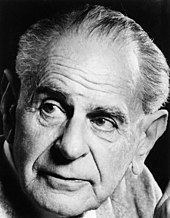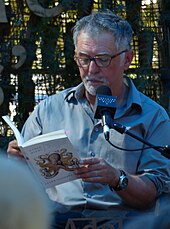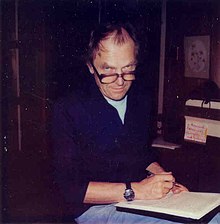Philosophy of science
[1] Subsequently, the coherentist approach to science, in which a theory is validated if it makes sense of observations as part of a coherent whole, became prominent due to W. V. Quine and others.A vocal minority of philosophers, and Paul Feyerabend in particular, argue against the existence of the "scientific method", so all approaches to science should be allowed, including explicitly supernatural ones.Philosophies of the particular sciences range from questions about the nature of time raised by Einstein's general relativity, to the implications of economics for public policy.[32] Some antirealists claim that scientific theories aim at being accurate only about observable objects and argue that their success is primarily judged by that criterion.[30] The notion of real patterns has been propounded, notably by philosopher Daniel C. Dennett, as an intermediate position between strong realism and eliminative materialism.This concept delves into the investigation of patterns observed in scientific phenomena to ascertain whether they signify underlying truths or are mere constructs of human interpretation.[36] This evaluation is pivotal in advancing research in diverse fields, from climate change to machine learning, where recognition and validation of real patterns in scientific models play a crucial role.The eleventh century Arab polymath Ibn al-Haytham (known in Latin as Alhazen) conducted his research in optics by way of controlled experimental testing and applied geometry, especially in his investigations into the images resulting from the reflection and refraction of light.Roger Bacon (1214–1294), an English thinker and experimenter heavily influenced by al-Haytham, is recognized by many to be the father of modern scientific method.[44] In 1637, René Descartes established a new framework for grounding scientific knowledge in his treatise, Discourse on Method, advocating the central role of reason as opposed to sensory experience.Interpreting Ludwig Wittgenstein's early philosophy of language, logical positivists identified a verifiability principle or criterion of cognitive meaningfulness.They also embraced Russell's logical atomism, Ernst Mach's phenomenalism—whereby the mind knows only actual or potential sensory experience, which is the content of all sciences, whether physics or psychology—and Percy Bridgman's operationalism.Logical positivism is commonly portrayed as taking the extreme position that scientific language should never refer to anything unobservable—even the seemingly core notions of causality, mechanism, and principles—but that is an exaggeration.These assumptions – a paradigm – comprise a collection of beliefs, values and techniques that are held by a given scientific community, which legitimize their systems and set the limitations to their investigation.[citation needed] One consequence of the Duhem–Quine thesis is that one can make any theory compatible with any empirical observation by the addition of a sufficient number of suitable ad hoc hypotheses.[78] With the advances of scientific disciplines, such as psychology and anthropology, the need to separate, categorize, normalize and institutionalize populations into constructed social identities became a staple of the sciences.Constructions of what were considered "normal" and "abnormal" stigmatized and ostracized groups of people, like the mentally ill and sexual and gender minorities.[81] A major development in recent decades has been the study of the formation, structure, and evolution of scientific communities by sociologists and anthropologists – including David Bloor, Harry Collins, Bruno Latour, Ian Hacking and Anselm Strauss.For example, in The Genealogy of Morals (1887) Friedrich Nietzsche advanced the thesis that the motive for the search for truth in sciences is a kind of ascetic ideal.One can trace this continental strand of thought through the phenomenology of Edmund Husserl (1859–1938), the late works of Merleau-Ponty (Nature: Course Notes from the Collège de France, 1956–1960), and the hermeneutics of Martin Heidegger (1889–1976).Another important development was that of Michel Foucault's analysis of historical and scientific thought in The Order of Things (1966) and his study of power and corruption within the "science" of madness.[86] Post-Heideggerian authors contributing to continental philosophy of science in the second half of the 20th century include Jürgen Habermas (e.g., Truth and Justification, 1998), Carl Friedrich von Weizsäcker (The Unity of Nature, 1980; German: Die Einheit der Natur (1971)), and Wolfgang Stegmüller (Probleme und Resultate der Wissenschaftstheorie und Analytischen Philosophie, 1973–1986).The philosophy of astronomy seeks to understand and analyze the methodologies and technologies used by experts in the discipline, focusing on how observations made about space and astrophysical phenomena can be studied.Given that astronomers rely and use theories and formulas from other scientific disciplines, such as chemistry and physics, the pursuit of understanding how knowledge can be obtained about the cosmos, as well as the relation in which our planet and Solar System have within our personal views of our place in the universe, philosophical insights into how facts about space can be scientifically analyzed and configure with other established knowledge is a main point of inquiry.[99] Philosophers of science began to pay increasing attention to developments in biology, from the rise of the modern synthesis in the 1930s and 1940s to the discovery of the structure of deoxyribonucleic acid (DNA) in 1953 to more recent advances in genetic engineering.Research in current philosophy of biology includes investigation of the foundations of evolutionary theory (such as Peter Godfrey-Smith's work),[100] and the role of viruses as persistent symbionts in host genomes.As a consequence, the evolution of genetic content order is seen as the result of competent genome editors [further explanation needed] in contrast to former narratives in which error replication events (mutations) dominated.Related to these areas of investigation, ontologies of specific interest to the philosophy of medicine include Cartesian dualism, the monogenetic conception of disease[104] and the conceptualization of 'placebos' and 'placebo effects'.Self-reports of feelings and beliefs may not be reliable because, even in cases in which there is no apparent incentive for subjects to intentionally deceive in their answers, self-deception or selective memory may affect their responses.Today, practitioners of both social and physical sciences instead take into account the distorting effect of observer bias and structural limitations.










Philosophy of Science (journal)PhilosophyOutlineGlossaryHistoryAncientAncient EgyptianAncient GreekMedievalRenaissanceModernContemporaryAnalyticContinentalAfricanEthiopiaSouth AfricaEastern philosophyChineseIndianIndonesiaVietnamIndigenous AmericanAztec philosophyMiddle Eastern philosophyIranianWesternAmericanBritishFrenchGermanItalianRussianBy religionBuddhistConfucianChristianIslamicJewishTaoistEpistemologyEthicsMetaphysicsAestheticsEducationLanguageMetaphilosophyOntologyPhenomenologyPoliticalReligionPhilosophersAesthetic philosophersEpistemologistsEthicistsLogiciansMetaphysiciansPhilosophers of mindSocial and political philosophersWomen in philosophyScienceLiteratureMethodBranchesFormalNaturalPhysicalSocialAppliedIn societyCommunicationCommunityFundingPolicyPseudoscienceScientistmethodsthe difference between science and non-sciencereliabilitymetaphysicalepistemicsemanticempirical disciplinemeta-studiesbioethicsscientific misconductscience studiestruth about unobservable entitieswhether inductive reasoning can be justifiedbiologyphysicseconomicspsychologyphilosophy itselfAristotlelogical positivistKarl Popperscientific methodologyThomas KuhnThe Structure of Scientific Revolutionsscientific progressparadigmcoherentistW. V. QuineStephen Jay Gouldaxiomaticuniformity of naturePaul Feyerabendscientific methodsupernaturalknowledge is createdsociologicalDavid BloorBarry Barnescontinental philosophygeneral relativitypublic policyreducedfoundations of statisticsphilosophy of medicinesocial scienceshuman naturevaluesDemarcation problemnon-sciencepsychoanalysis
